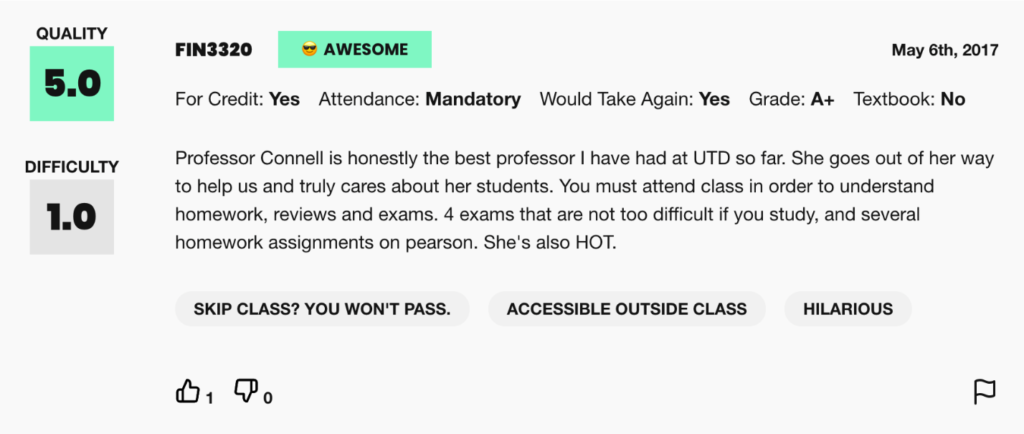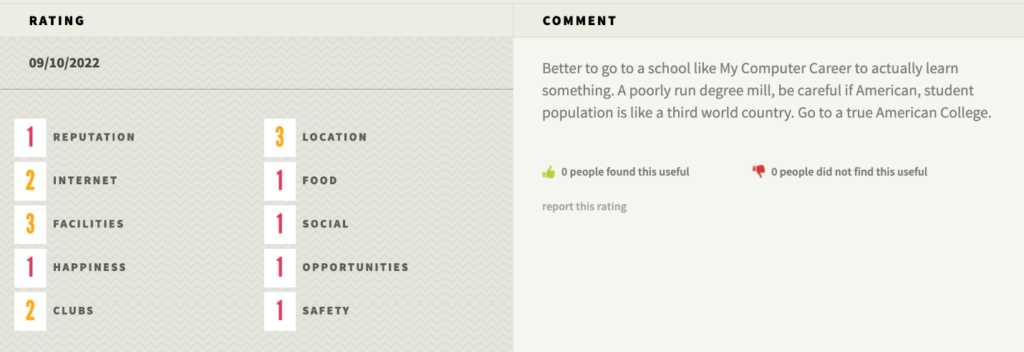Since 1999, the website RateMyProfessor has allowed University students to anonymously review their teachers in an public online forum. Since its creation, the site has been a subject of controversy. Is RateMyProfessor a useful metric? Or is it just plain mean?
Professor Syed Naqvi, a member of the faculty senate and a UT Dallas professor for the School of Interdisciplinary Studies said that RateMyProfessor can be a place where students will attempt to extract revenge for being caught in poor academic practices.
“It’s almost a way to explain what a bad metric would be.” Naqvi said.
Reviews do not disappear on the website over time. Past comments are viewable to the sites visitors years after the review is posted. One such comment on a professor from the College of Business, Michelle Connell reads:

RateMyProfessor initially offered the ability for students to select a ‘chili pepper’ to indicate if the professor they were reviewing was attractive. Due to criticism, this function was removed but the same courtesy was not extended to reviews on the site. As it is, a professor’s career and the subsequent ratings allow zero nuance overtime.
For finance senior Zack Nguyen, RateMyProfessor has been a useful tool during his college career. Students looking to have a level of control over their in-class education can use the site to pick teachers who are rated better than others.
“I use RateMyProfessor every time I need to pick classes for the semester,” he said. “I try to look for classes in my major that are rated highly on the site and also have reviews about leaving knowing more than when people started.”
Interestingly, both interviewees expressed that RateMyProfessor can be useful in comparing how different professors conduct their classes. Professor Naqvi shared his thoughts on the sites rating function.
“I’m always impressed with professors who have a high rating in both difficulty and the overall course,” he said. “Both identifying that perhaps the definition of a successful course is not necessarily making it easy for students.“
Functions on RateMyProfessor extend beyond its namesake. Students can also rate their university based on perceived reputation, its facilities, and other categories. UT Dallas holds a 3.7 out of 5 rating on RateMyProfessor. Its most recent review reads:
Hateful ratings like this, call the sites anonymity function into question. Positive or negative, reviewees do not have to put their name on what they write. Does the fact that students can write reviews anonymously impact the site? Nguyen seems to think so.
“Absolutely it does, no one would use the site if our names were attached to it. Especially since most of the time it’s used when people have bad experiences,” Nguyen said.
Remaining anonymous seems to be pivotal to the sites success, but this also has the potential to give students a platform to publish hateful things with no consequence. Professor Naqvi said that occasionally he does check his own profile on the site
“There are a lot of times I get upset at the notion of someone being uncharitable and I just remember that the world isn’t about me and sometimes stuff that happens to me isn’t even really about me,” Naqvi said.





